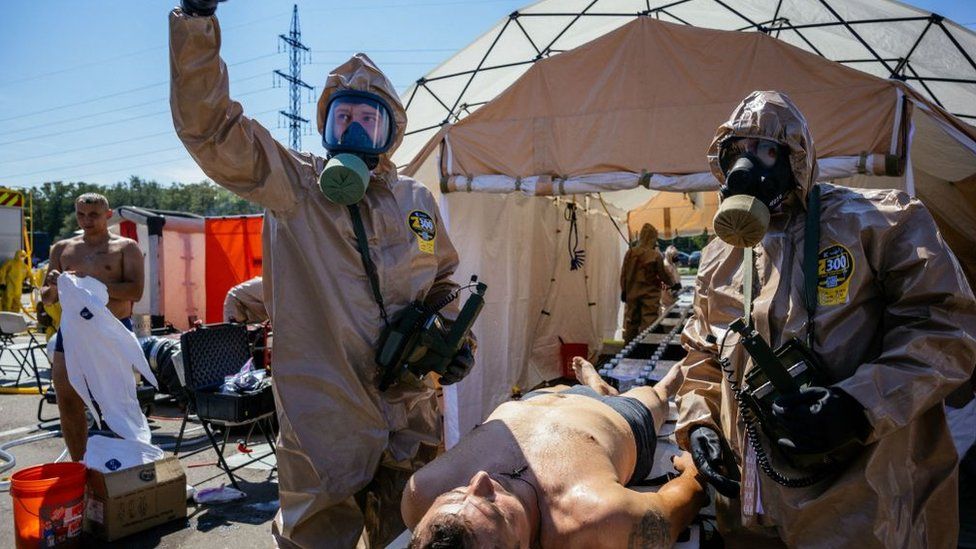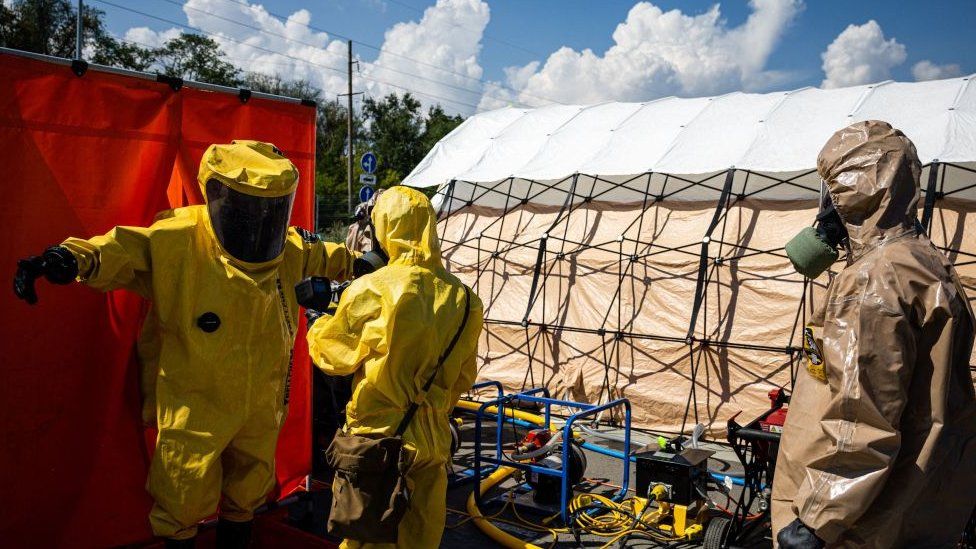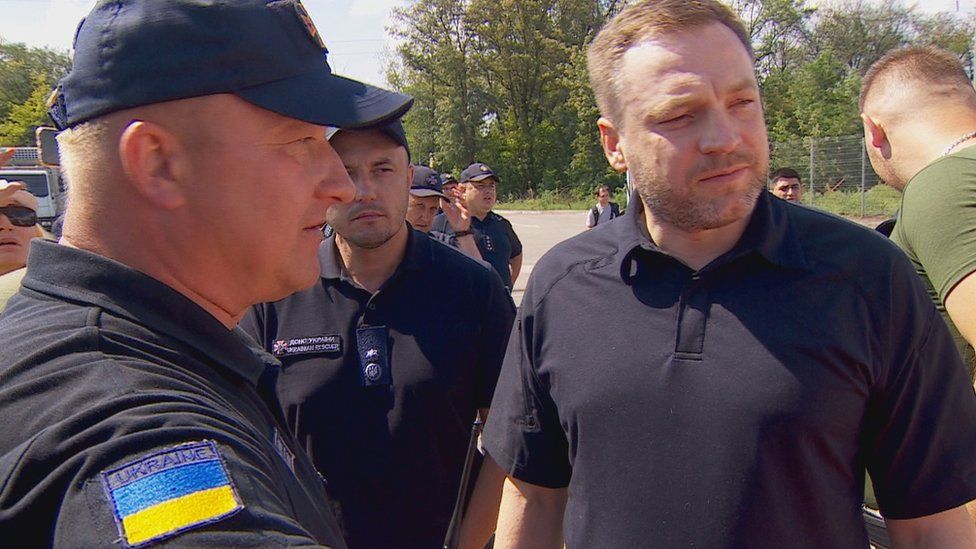It is relatively unusual in Ukraine for a government official to invite you on a short-notice trip.
It turns out it is more common for that invitation to come with very little detail.
The main reason for that is security – it is not exactly wise to publicise when a minister is going to be somewhere, especially when you are being invaded by another country.
We decided to accept, and soon found ourselves at an airfield near Kyiv, where we and other journalists were led onto a helicopter.
By this point we knew our destination was the city of Zaporizhzhia, and the subject was the growing danger from the region’s nuclear power plant further south.
Within 30 seconds of the journey starting, I realised why we were offered anti-nausea tablets before taking off.
To stay undetected, the pilot keeps the helicopter around 10 metres off the ground, occasionally hurdling over electric powerlines.
There are endless fields of sunflowers. Some are in full bloom, some are wilting, past their best. Regardless, the harvest is fast approaching.
Then there is the dense woodland – thousands upon thousands of towering trees which come so close to touching the skids of the chopper.
You are left under no illusion of Ukraine’s vast and rich landscape.
After landing in Zaporizhzhia, you are struck by two things: the more industrious skyline in comparison to Kyiv, as well as the humidity.
We end up at a supermarket car park where emergency workers are dressed in yellow hazmat suits. They are practising cleaning drills in the event of a radioactive contamination.
They are watched by senior officials, who are keen to see how ready the region would be in the event of a worst-case scenario.
“Of course we are concerned,” Ukraine’s Energy Minister Herman Halushchenko tells me. “The situation changed dramatically when the Russians started shelling the area on 5 August.”
Ukraine says the situation at the plant is “approaching critical”.
Russian forces have occupied the site, Europe’s biggest, since early March.
They have been urged to hand control back because of the dangers, and some staff there have told the BBC they’re “being kept at gunpoint”.
For the past two weeks there’s been heavy shelling on and around the plant, with the sides blaming each other.
Nato is the latest international organisation to call for United Nations inspectors to be let into the Zaporizhzhia power plant, claiming its seizure posed a serious threat to Ukraine and neighbouring countries.
Officials say the plant could be cut off from power as Moscow tries to redirect electricity to Crimea, which it annexed eight years ago.
“It is impossible to ensure the safety of the nuclear power plant while the Russian occupying forces are there,” says Denys Monastyrskyy, Ukraine’s interior minister.
“It is the key concern that we all should understand,” he adds.
The car park is also a place where Ukrainians who manage to make it out of Russian-occupied territories first arrive.
There are queues of cars with people and full suitcases.
Sitting in the shade we meet Olena, who has just made it out of the city of Enerhodar, where the nuclear plant is located.
“It’s scary, very scary, there is shelling all the time,” she says while bouncing her toddler on her knee.
“There have been many more explosions and it became too dangerous to stay there.
“I didn’t want to leave home, but I had no choice.”
This car park represents Ukraine controlling what it can.
Unable to force the Russians from Europe’s biggest nuclear power plant, the country is instead trying to prepare for the worst, if it happens.



San Francisco to allow police to use robots with lethal capabilities
Supervisors in San Francisco voted Tuesday to give city police the ability to use potentially lethal, remote-controlled robots in emergency situations -- following an emotionally charged debate that reflected divisions on the politically liberal board over support...
Gas prices dropping, with several stations in Cleveland area below $3 per gallon
Ohioans paid record prices for gas for a Thanksgiving holiday this year, but drivers could see a much different situation by the time Christmas arrives. Decreasing demand and the falling price of oil are causing a decline in gas prices in Ohio and across the nation,...
World Food Programme ups aid to Lebanon to $5.4bn over three years
The World Food Programme will give $5.4 billion in aid over the next three years to Lebanon, which is grappling with a devastating economic crisis that has plunged much of the population into poverty. The announcement came after a meeting between caretaker Prime...
Lebanon to adopt exchange rate closer to currency’s real value
Lebanon's Central Bank will adopt an exchange rate for dollar withdrawals that is closer to the crashing currency's real market value, central bank governor Riad Salemeh said in a televised interview on Monday. “We are in the process of unifying the exchange rates”,...
Submit your event
We will be happy to share your events. Please email us the details and pictures at publish@profilenewsohio.com
Address
P.O. Box: 311001 Independance, Ohio, 44131
Call Us
+1 (216) 269 3272
Email Us
Publish@profilenewsohio.com


